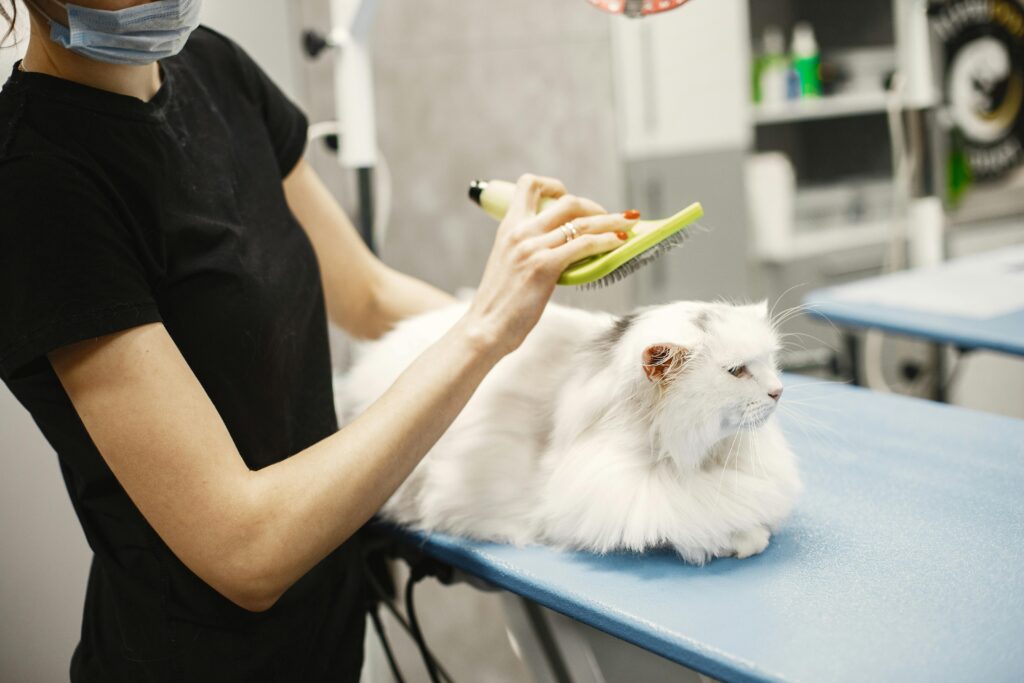As a cat parent, it’s important to be aware of the signs that indicate your feline friend may be experiencing stress. Cats are sensitive creatures, and even seemingly minor changes in their environment or routine can trigger stress. Understanding these signs can help you identify when your cat is stressed and take appropriate steps to alleviate their anxiety. Here are 10 common signs that your cat may be stressed:
1. Changes in Appetite
One of the first signs of stress in cats is a change in their eating habits. If your cat suddenly loses interest in food or starts eating significantly less, it could be a sign that they are feeling anxious or overwhelmed. On the other hand, some cats may stress eat and consume more food than usual.
2. Increased Aggression
Stress can also manifest as aggression in cats. If your cat becomes more aggressive than usual, such as hissing, scratching, or biting, it may be a sign that they are feeling stressed. This aggression can be directed towards other pets in the household, family members, or even objects.
3. Excessive Grooming
Cats are known for their grooming behavior, but excessive grooming can be a sign of stress. If you notice your cat constantly licking or chewing on their fur, to the point of causing bald patches or skin irritation, it could be a sign that they are trying to cope with stress.
4. Avoidance Behavior
When cats are stressed, they may try to avoid certain situations or people. If your cat starts hiding, retreating to secluded areas, or avoiding interactions with you or other pets, it could be a sign that they are feeling stressed. They may also become less active or show a lack of interest in their usual activities.
5. Changes in Sleeping Patterns
Stress can disrupt a cat’s normal sleeping patterns. If your cat is sleeping more than usual or having difficulty sleeping, it could be a sign of stress. On the other hand, some cats may become restless and have trouble settling down to sleep.
6. Inappropriate Elimination
Stress can lead to changes in a cat’s litter box behavior. If your cat starts urinating or defecating outside of their litter box, it may be a sign that they are feeling stressed. This behavior can also be a result of medical issues, so it’s important to rule out any underlying health problems.
7. Excessive Vocalization
Some cats may become more vocal when they are stressed. If your cat starts meowing, yowling, or making other loud noises more frequently or at unusual times, it could be a sign that they are experiencing stress. This excessive vocalization is their way of expressing their discomfort.
8. Changes in Body Language
Stressed cats may exhibit changes in their body language. They may hold their body tense, with their ears flattened back and their tail tucked close to their body. They may also exhibit dilated pupils and a hunched posture. These physical signs can indicate that your cat is feeling stressed.
9. Overreacting to Stimuli
When cats are stressed, they may become more sensitive to stimuli in their environment. They may startle easily, become hyper-vigilant, or react strongly to minor changes or noises. This overreacting to stimuli is a sign that your cat is on edge and feeling stressed.
10. Changes in Social Behavior
Stress can also impact a cat’s social behavior. Some cats may become more clingy and seek constant attention, while others may withdraw and avoid interactions. If your cat’s social behavior changes significantly, it could be a sign that they are stressed.
How to Help a Stressed Cat
If you notice any of these signs in your cat, it’s important to take steps to help alleviate their stress. Here are some strategies you can try:
1. Create a Safe Space
Provide your cat with a quiet and secluded area where they can retreat to when they feel stressed. This can be a separate room or a cozy corner with their bed, toys, and a scratching post. Make sure this space is off-limits to other pets or children.
2. Maintain a Consistent Routine
Cats thrive on routine, so try to keep their daily routine as consistent as possible. Feed them at the same time each day, provide playtime and exercise, and stick to a regular sleep schedule. Predictability can help reduce their stress levels.
3. Provide Environmental Enrichment
Enrich your cat’s environment with toys, scratching posts, and climbing structures. This will give them outlets for their natural behaviors and help alleviate boredom and stress. Rotate their toys regularly to keep things interesting.
4. Use Pheromone Diffusers
Pheromone diffusers, such as Feliway, release synthetic pheromones that can help calm and comfort cats. These diffusers can be plugged into electrical outlets in your home and provide a sense of security for your stressed cat.
5. Play and Bond with Your Cat
Engage in interactive play sessions with your cat using toys that stimulate their natural hunting instincts. This can help reduce their stress and strengthen the bond between you. Spend quality time with your cat, offering them attention, affection, and reassurance.
6. Consult with a Veterinarian
If your cat’s stress persists or worsens despite your efforts, it’s important to consult with a veterinarian. They can rule out any underlying medical conditions and provide additional guidance on managing your cat’s stress. In some cases, medication may be prescribed to help alleviate your cat’s anxiety.
7. Minimize Stressful Triggers
Identify and minimize any triggers that may be causing stress for your cat. This could include loud noises, changes in the household, or interactions with certain individuals or pets. By reducing these stressors, you can help create a more peaceful environment for your cat.
8. Consider Holistic Remedies
There are various holistic remedies that can help reduce stress in cats, such as herbal supplements or flower essences. However, it’s important to consult with a veterinarian or a holistic veterinarian before trying any of these remedies to ensure they are safe and appropriate for your cat.
9. Practice Calming Techniques
There are several calming techniques that can help relax a stressed cat. These include gentle massage, slow and soothing music, and providing a warm and cozy environment. Experiment with different techniques to see what works best for your cat.
10. Give Your Cat Time and Patience
Remember that every cat is unique, and it may take time for your cat to adjust and overcome their stress. Be patient with them and provide them with the love and support they need. With time and proper care, most cats can recover from stress and regain their emotional well-being.
FAQs about Cat Stress
Here are answers to some frequently asked questions about cat stress:
1. Can cats get stressed?
Yes, cats can experience stress, just like humans. They are sensitive creatures and can be easily affected by changes in their environment or routine.
2. What are the common causes of cat stress?
Common causes of cat stress include changes in the household, such as moving to a new home or the addition of a new pet, loud noises, lack of stimulation, and conflicts with other animals.
3. How long does cat stress last?
The duration of cat stress can vary depending on the cause and the individual cat. Some cats may recover quickly, while others may take longer to adjust. It’s important to provide them with the necessary support and care during this time.
4. Can stress in cats lead to health problems?
Yes, chronic stress in cats can lead to various health problems, including digestive issues, urinary problems, and a weakened immune system. It’s important to address and manage their stress to prevent these health complications.
5. Can I use essential oils to calm my stressed cat?
No, it’s not recommended to use essential oils on cats without consulting with a veterinarian. Cats have a unique metabolism and can be sensitive to certain essential oils, which can be toxic to them.
6. Will getting another cat help my stressed cat?
Introducing another cat to a stressed cat’s environment may not always be the best solution. It can potentially increase their stress levels and lead to conflicts. It’s important to assess your cat’s individual needs and consult with a veterinarian before making such a decision.
7. Can I use medication to treat my cat’s stress?
In some cases, medication may be prescribed by a veterinarian to help manage a cat’s stress. However, this should be done under the guidance of a professional and as a last resort when other methods have been unsuccessful.
8. Can outdoor cats experience stress?
Yes, outdoor cats can also experience stress, especially if they encounter territorial conflicts with other cats or face dangers in their environment. Providing them with a safe and enriched outdoor space can help alleviate their stress.
9. Are some cat breeds more prone to stress?
While individual cats within a breed can vary, certain breeds, such as Siamese and Abyssinians, are known to be more prone to stress. However, it’s important to remember that each cat is unique, and their personality and experiences play a significant role in their stress levels.
10. Can I prevent stress in my cat?
While it may not be possible to completely prevent stress in cats, there are steps you can take to minimize their exposure to stressors and provide them with a supportive and enriched environment. Understanding your cat’s needs and providing them with love and care can go a long way in reducing their stress levels.









